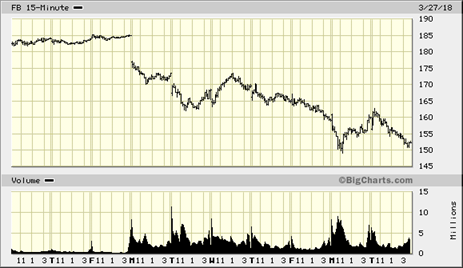The Efficient Market Hypothesis is a mainstay of academic thinking about financial markets. It is rejected by many traders and money managers. Warren Buffett, for example, famously said that he would be on a corner, selling pencils from a tin cup if markets were efficient.
I do not expect to settle this decades-long debate in a single blog post. Instead, I will share how my own personal thinking changed along with my career – from college professor, to financial analyst, and to investment manager. I hope to stimulate and to provoke; we can all benefit from some wise comments. I will also suggest a few ideas we might consider to exploit inefficiency.
Provocative Examples
It is often useful to have a specific example in mind. Let’s start with Facebook (FB), a company familiar to all. Here is a chart of recent stock action:

Let’s consider four time periods.
My question, and it is a question, is whether the market was efficient at both the start of this process and at the end. This seems inconsistent.













Leave A Comment